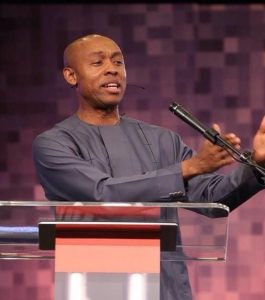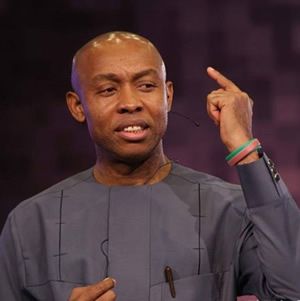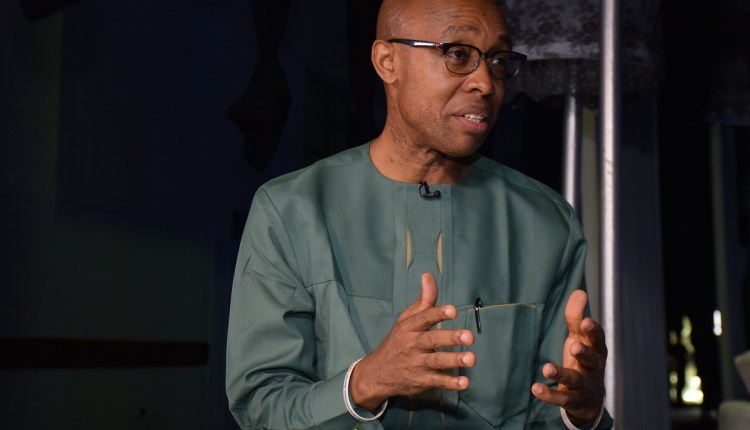Chidi Anselm Odinkalu is a Professor of Law who needs no introduction. For almost 30 years, Chidi as he is fondly called in the pro-democracy circles, has been in the fore front of the fight for human and peoples’ rights in Nigeria. From Kajuru, to Maiduguri; Makoko to Onitsha, you’ll always find Chidi in places where people and communities are being oppressed. He was once the Chairman of the National Human Rights Commission (NHRC). In this interview with the Publisher of Gavel International, Mustapha Ogunsakin, Prof Odinkalu expresses his views about the state of the Nigerian judiciary. Excerpts:
COVID-19 seems to have altered so many things, particularly, our ways of doing things. How do you think it has, and will affect the Nigerian judiciary henceforth?
I agree that our contemporary living is probably going to be divided up into BC and AC – Before Covid and After COVID. This current situation has certainly challenged our orthodoxies globally.
In Nigeria, it has surely shown up our many inanities as well as the shallowness of our leadership at all levels. It’s not as if we needed to be told that much of how we carried on was unsustainable. What COVID-19 has done, however, is to force a breakdown in official resistance in many areas.
One of such is in judicial administration and the legal process. Before COVID-19, most of our courts deeply resisted digitization. For some weird reason, judges were happy to assign cases manually, keep records by long hand and generally carry on in the administration of judicial voodoo.
COVID-19 has won this argument for us. So, the question now is how far and how fast can we go with digitization? My hope is that this will be seen by those in the senior levels of judicial administration as an opportunity to administer a bazaar for contracts because there is no money to share anymore. What this offers us is an opportunity to deliver value-for-money and optimize efficiencies in the judicial system. It’s not going to be easy though, because there are considerable infrastructural deficits to overcome. Imagination will be needed in dollops.
A Lagos High Court last week delivered the State judiciary’s first virtual judgment on a murder case. If you were the defendant’s lawyer, will you accept the judgement? If yes, why? If no, what would you do to get justice for your client?
The defendant, I am told, had a lawyer and I will not presume to second-guess a lawyer in the active conduct of his or her case through the media. That would be professionally discourteous. In any case, appeal is mandatory in all capital cases in Nigeria.
That said, I find something truly unsettling about sentencing a person to death by Zoom. I am sure even the owners or makers of the Zoom app did not think of that possibility when they designed it. In my view, it is inhumane to pronounce capital punishment by Zoom. This point is not about whether you support or oppose capital punishment. Even people who support capital punishment enthusiastically may struggle to come to terms with the idea that it can be pronounced by Zoom. What is next: maybe we execute people by zapping them at the press of a button?! My hope is that this issue will receive higher judicial attention.

Do you honestly think Nigerian judiciary is ready for virtual proceedings? What can the leadership do to prepare the judiciary for this inevitable phase of our lives? At a webinar recently, you also talked about “algorithmic justice”. What do you mean by this?
The digital ecosystem is based on computer programmes which are written in Algorithms. When that is applied to the justice system, you can call it Algorithmic justice. That’s really what it is. Now, algorithmic justice is an engineering solution applied to the challenges of efficiencies in the justice system. It would be based on basic assumptions in terms of infrastructure, rules, skills, systems.
In Nigeria, much of these are really quite rudimentary and uneven. So, Algorithmic justice will struggle here to begin with. That doesn’t mean it should not begin. It just means there will be problems. Take skills, for instance. Both judges and lawyers need help here. Many judges as well as lawyers cannot send SMS messages. That applies to their staff too. That is why a judge will know that they will not sit but will not instruct his or her staff to notify all the lawyers with cases on the day, which will take only a few SMS messages. Rather, lawyers will travel from all over the place and gather in the court only to be informed by an indifferent registrar that the judge will not sit. By this time clients have spent money to fund the lawyer’s travel to court; the lawyer has spent anxious moments preparing and has been exposed to road risk. There is opportunity cost in other pressing matters that the lawyer could have done.
All of that would have been achieved in order to shield the digital illiteracy of a judge and his or her staff. It’s quite frankly unforgivable. So yes, there are lots of things we need to address, beginning with awareness and skills.
We also have to change our ways. Chief Judges are usually unwilling to give up the power to assign cases manually because they know that is how they can determine a case before it is even heard. Through the power of assignment of cases, a Chief Judge can decide to send the case to a judge whose views he or she knows to be favorable to an outcome the Chief wants.
Algorithmic justice would be surrendering the power of assignment to an Algorithm which will process and assign new cases as they come in. Many Chief Judges will resist this but you really can’t be assigning cases manually or keeping manual records and then saying you are trying to do digital or remote justice. It doesn’t work that way.
At the same webinar, you prophetically stated that judicial processes will henceforth be more about engineering than law. Can you please expatiate on this?
You know I am no prophet or G.O., so I cannot be “prophetic”. But really, remote justice is more about engineering than about law. The problem of relocating judicial proceedings from the physical courtroom to a virtual one is an engineering proposition and an Algorithmic one.
It is not for judges and lawyers as such but for those who write programmes and design apps. That is why I kind of muffle laughter when I see all these Senior Advocates taking their Silk gowns and wielding their wordy preliminary objections at what they refuse to understand or theorise. It’s just so unimaginative, I’m sorry. People want to live in antediluvian.
Last week, the Supreme Court delivered a judgment ordering the retrial of former Abia State Governor, Orji Uzor Kalu. What is your take on that judgment?
I have read the judgment. My take is that the media may have mis-characterized the case and what took place. Orji Kalu was actually a respondent in the appeal. There was no order pertaining to him. So I can’t see how it can be called his case.
On the substantive issue in the appeal, I think the Supreme Court should be careful about how it stands in the inevitable curve of posterity. There is a lot of perfunctory technicalisation of justice by the Supreme Court which is frightening.
Look, criminal proceedings take time to come to trial and even more time to conclude. To say that after 13 years, you can just send a case back because the judge who did the case complied with law in force at the time in order to complete the case seems to me wasteful to the point of senselessness. Court of Appeal Justices sit to conduct Commissions of Inquiry, which can be reviewed by the High Court. I have not heard that declared unlawful. Have you?
Recently, Northern state governors have been sending almajiris to their different states across the North. Some of these almajiris are finding their way to the Southern part of the country. How do you think this will affect the whole country?
Almajiris are human and Nigerians like you and I. They are citizens too. What the Northern Governors have done is to use the difficult situation of a pandemic to punish child destitution while abdicating responsibility over the root causes which are irresponsible procreation by the adults (parents) and commercialization of child destitution (by the Mallams).
As long as the governors are unwilling to address these two issues, my view is that they are not serious. It is beyond irresponsible to be trafficking these children the way these governors are doing in the middle of a contagion because what they are doing is spreading the disease irresponsibly. You can see how the Almajiris from Kano have become the cause of spikes in Bauchi-Gombe; Jigawa, Kaduna, Sokoto, Katsina. That was easily avoidable.
The quality of judgments emanating from our courts, particularly the Apex Court has given Nigerians a lot of concern. For example, the Imo Case, and even the Bayelsa Guber case where the court lashed out on senior lawyers. What in your opinion is wrong with our Bench? Do you think our judges are compromised or they simply lack the intellectual capacity to deliver?
I have already flagged this earlier. I have also had my say on the judgment of the Supreme Court in the Ihedioha case. It is innumerate and inexcusable.
In any case, Hon. Justice Nweze adequately put the majority in its place in his dissent. I think that the Court will struggle to recover credibility from that infamy. Underlying the increasing perfunctoriness of decision making at the apex level of the judicial system here is the fact that the court suffers a deluge of mostly needless and irrelevant appeals.
So, appeals from 2008-2010 are now being scheduled for the next 2-3 yrs but politicians can have their cases do double quick time to the Supreme Court. That is messed up! Politicians have hijacked our courts. There is really no time for the justices to process their reasoning as such or refine it. A tyranny of quantity therefore ensues which is a graveyard for quality decision making and reasoning.
A group to which you belong last week asked President Buhari not to honour and appoint 33 judges listed for appointment as Federal High Court judges. Another group came out to disprove the claim. What is your take on this issue and the attendant problems associated with the appointment of judges in Nigeria?

Did you say “disprove”? How? Just for the record, you don’t disprove verbs with adjectives please. I stand by every comma and full stop in our letter to the President.
The narrative of capture of the Nigerian state and its capabilities and institutions by narrow personal and family interests is nearly total. Look, the judicial office is not an inheritance transmitted by Mummy or Daddy to a child. It is also not sexually transmitted like pregnancy from husband to wife. Ok?
So, Justice Bulkachuwa retires as Court of Appeal President for instance and wants to plant on the Bench her 30-something year-old daughter who could not hold down a job in the presidency nor bother to show up for it. Go and ask and find out. And you think we should all keep quiet?
That is judicial insider-dealing. If it happens on a properly regulated course, people like that will go to jail. Here, we call them “My Lord”. It stinks! It may not be popular but we have a duty to fight it. We gave the names of the people who are Mummy And Daddy or husband and wife nominees on the list, no? Has anyone come out to say they are not?
Of course not. I have nothing against these children whose only claim to qualification is whose child they are. But can they just compete on equal footing with others? You don’t rig the process and then say you have done a selection. When you do that, you exclude fit candidates from the field.
That is unlawful actually. You can also see in the past week the Presidential Committee Against Corruption (PACAC) has backed us in this. And we now have an action instituted by a lawyer from Akwa Ibom claiming that no candidate from Akwa Ibom was considered in the process of recruitment which is contrary to the requirement of Federal Character in the FCT High Court Act. Our facts are very credibly attested. We know where the other people you refer to come from but this is not the place to tell them because they know themselves.
A few days ago, Nyesom Wike, governor of Rivers State ordered the demolition of a hotel for flouting lockdown regulations. What is your take on the demolition?
The awful thing about this Wike thing is that he is actually a Life Bencher and Benchers are the ultimate repositories of the authority of law in Nigeria because they are responsible for admitting new entrants to the Bar. The lawlessness of his conduct is staggering. But I believe he enjoys his mis-guided enthusiasm because he believes he controls the courts in his territory. That is an even greater shame than his conduct.
Dear readers, we really need your support to keep on serving you with authoritative, truthful, and juicy stories everyday. For your support, please reach out to the editor @gavelinternational66@gmail.com

